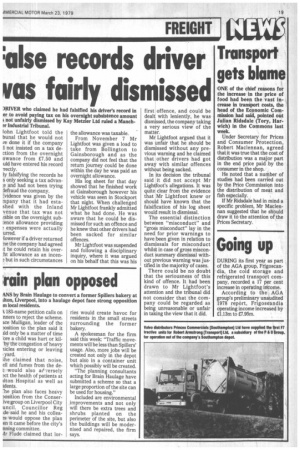lalse records driver vas fairly dismissed
Page 21

If you've noticed an error in this article please click here to report it so we can fix it.
)RIVER who claimed he had falsified his driver's record in er to avoid paying tax on his overnight subsistence amount 5 not unfairly dismissed by Kay Metzler Ltd ruled a Manchu Industrial Tribunal.
lohn Lightfoot told the bunal that he would not ye done it if the company I not insisted on a tax dection from the overnight owance from £7.50 and ,uld have entered his record Tectly.
3y falsifying the records he s only seeking a tax advanr,e and had not been trying defraud the company.
vidence was given by the mpany that it had estashed with the Inland venue that tax was not (able on the overnight subtence allowance providing expenses were actually urred.
iowever if a driver returned Tie the company had agreed it he could retain his over:ht allowance as an incena but in such circumstances the allowance was taxable.
From November 7 Mr Lightfoot was given a load to take from Bollington to Gainsborough and as the company did not feel that the return journey could be done within the day he was paid an overnight allowance.
His log sheet for that day showed that he finished work at Gainsborough however his vehicle was seen in Stockport that night. When challenged Mr Lightfoot frankly admitted what he had done. He was aware that he could be dismissed for such an offence and he knew that other drivers had been sacked for similar offences.
Mr Lightfoot was suspended and following a disciplinary inquiry, where it was argued on his behalf that this was his first offence, and could be dealt with leniently, he was dismissed, the company taking a very serious view of the matter.
Mr Lightfoot argued that it was unfair that he should be dismissed without any previous warning and he claimed that other drivers had got away with similar offences without being sacked.
In its decision the tribunal said it did not accept Mr Lightfoot's allegations. It was quite clear from the evidence that Mr Lightfoot knew or should have known that the falsification of his log sheet would result in dismissal.
The essential distinction between "misconduct" and "gross misconduct" lay in the need for prior warnings to have been given in relation to dismissals for misconduct whilst in case of gross misconduct summary dismissal without previous warning was justified in the majority of cases.
There could be no doubt that the seriousness of this kind of offence. It had been drawn to Mr Lightfoot's attention and the tribunal did not consider that the company could be regarded as being unreasonable or unfair in taking the view that it did.
















































































































